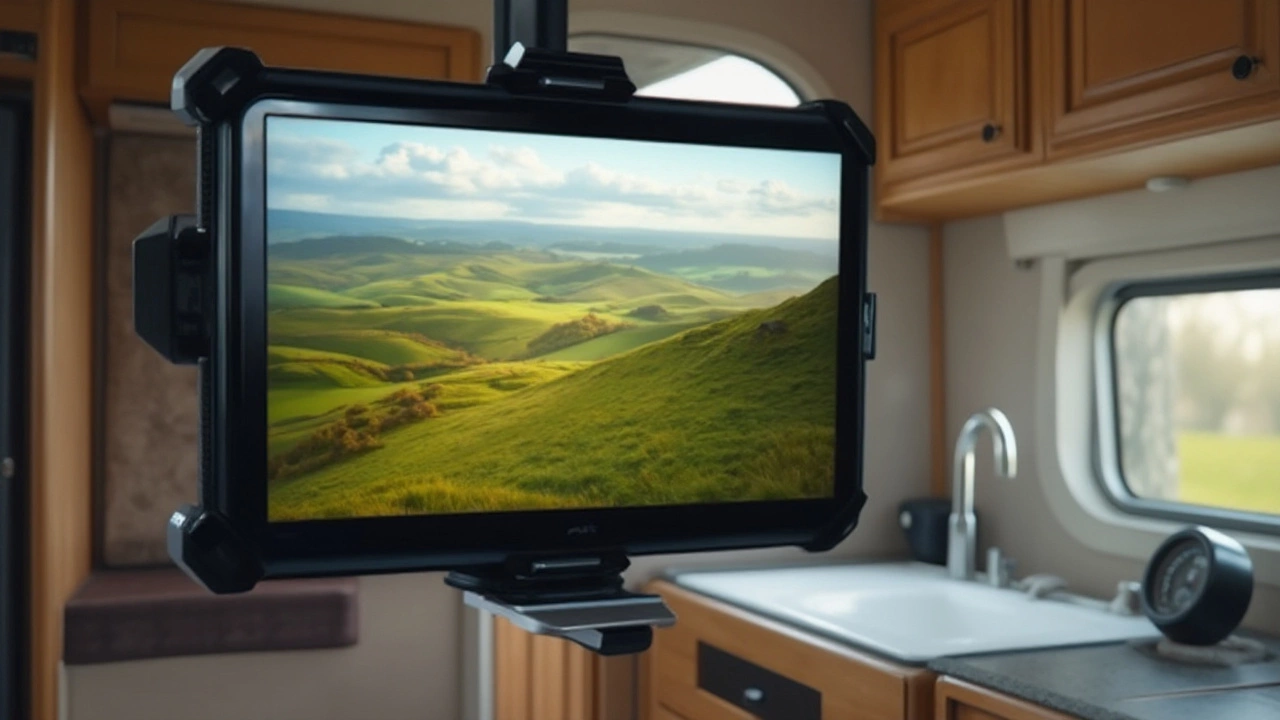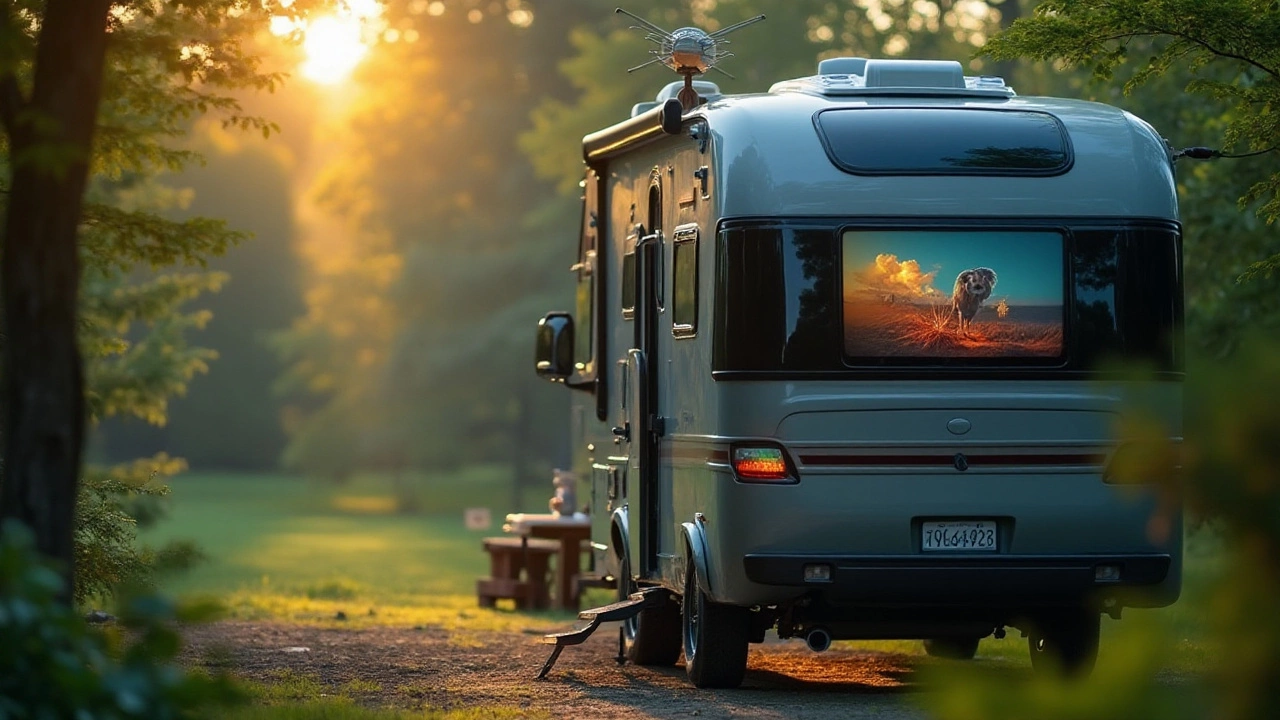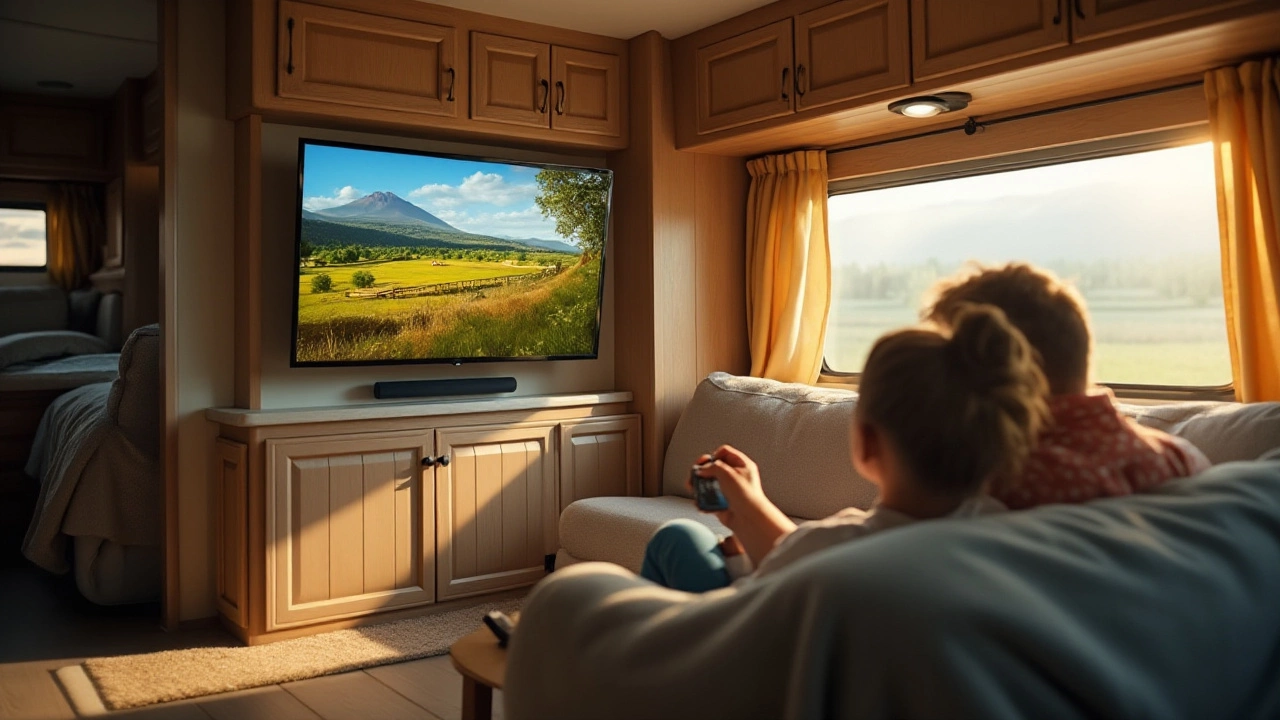When planning a road trip in your RV, entertainment is often a big part of making those long stretches enjoyable and relaxing. But does that mean you'll need a special kind of TV? Selecting the right television for your mobile home isn’t always straightforward, and understanding your options can transform your travel experience.
While you could technically use a standard TV, RV-specific models come with advantages designed to fit the unique challenges of life on the road. These TVs are crafted for efficiency, able to handle power variations, and are more robust for withstanding travel vibrations. Dive in as we explore the aspects that differentiate regular TVs from those made for RV purposes, unpack the benefits, and contemplate whether a specialized TV is necessary for your adventures.
- Understanding RV-Specific TVs
- Benefits of a Specialized TV
- Installation and Power Considerations
- Alternative Entertainment Options
Understanding RV-Specific TVs
When you first venture into the world of motorhome travel, one of the intriguing choices you'll encounter is whether to invest in an RV TV. As you roll down highways and park under sprawling skies, these entertainment units are designed to enhance your trip, providing more than just a diversion from scenic landscapes. The core design of these televisions differs significantly from a typical household setup, adapting to the unique challenges posed by life on wheels.
The most obvious distinction is the build quality. Unlike regular televisions, RV-specific models boast reinforced structures to withstand continuous vibrations and jostling. Regular TVs are created for static environments; therefore, their chances of survival nosedive with each rocky road. This vibration-resistant nature makes RV variants particularly resilient, ensuring your entertainment system remains intact much longer than a typical TV would.
Power consumption also plays a pivotal role in differentiating RV TVs from household ones. Since RV entertainment often relies on limited power reserves, these TVs are engineered to use minimal energy. Many models operate efficiently on the 12-volt power that most RVs supply, avoiding the need for converters and making them perfect companions when you're running on battery power out in the wild. Additionally, their ability to quickly switch between AC and DC power sources further contributes to this power efficiency. According to a 2023 survey by RVIA, nearly 70% of RV users prioritize energy efficiency when purchasing new equipment, underscoring the importance of this feature.
"The greatest thing about RV TVs is that they consider the nuances of life on the road that often gets overlooked," noted Cara Less, an RV tech enthusiast, in her article for Practical Motorhome. "They turn a simple purchase decision into a seamless part of the traveling experience."
One cannot ignore the brilliant engineering of these devices concerning signal reception. While standard televisions might require cable or robust broadband connections, RV-focused models often come equipped with tuners capable of fetching signals in remote areas. This ability can be a game-changer for those who think of their RV as a flagship of freedom. You can cross country borders or camp in areas with limited connectivity without missing your favorite shows. Some cutting-edge versions even integrate satellite compatibility, although some motoring enthusiasts might opt for portable satellite dishes for broader reception.
Space-saving abilities are also important when considering an RV tech solution. These TVs are built with lightweight materials and often come with mounting options to fix them securely against walls or cabinets. This advantage ensures that they occupy minimal space—an essential feature given the compact nature of most motorhomes. Additionally, merging functionality with finesse, some models offer foldable features or swivel arms, offering flexible viewing experiences without occupying unnecessary room.
What makes an RV TV truly stand out is its integration capabilities with various devices, ranging from DVD players to gaming consoles. Given that family trips are enhanced with diverse entertainment options, these TVs often include multiple input ports like HDMI and USB, making them versatile hubs compatible with modern tech gadgets. A well-chosen RV TV could serve both as an entertainment console and a family bonding tool, turning downtime into cherished together moments. With these focused capabilities, motorhome televisions are not just luxuries but thoughtful investments to improve the quality of life for any adventurer who loves to hit the open road.

Benefits of a Specialized TV
Choosing a RV TV over its household counterpart can enhance your on-the-go viewing experience for a multitude of reasons. For starters, one of the most significant advantages is durability. Due to the nature of travel, an RV TV is built to withstand constant vibrations, bumps, and all manner of road conditions that would spell the eventual doom for a regular television. These issues are especially crucial given the diverse terrains you may encounter while zipping through highways and meandering paths alike. Stellar road stability in a TV can significantly reduce repair or replacement costs in the long run, making the initial investment worthwhile for frequent travelers.
Another remarkable benefit lies in power efficiency. RVs often run on limited power resources, sometimes relying on batteries or solar panels. Specialized RV TVs are designed to consume less power while still delivering excellent picture quality. This energy efficiency means longer viewing hours without the anxiety of draining the RV's power reserve. Some models even have the ability to connect directly to the RV's 12V system, eliminating the need for power inverters that can be energy-inefficient.
On the technical side, many of these motorhome television sets come with built-in tuners that are adept at picking up over-the-air channels even in remote areas. This feature increases accessibility to a breadth of viewing options, often without the necessity of a satellite dish or other external signal solutions. Additionally, the screens of RV TVs are optimized for broader viewing angles and anti-glare functionalities, ideal for the compact and often uniquely lit environments of RV interiors.
"An RV TV isn't just a piece of luxury—it’s a vital tool to make the journey as memorable as the destination," notes Leisure Family Traveler magazine, highlighting the role of these devices in enhancing the travel experience.
There's also the aspect of ease of installation and versatility. Designed for the unique spaces of motorhomes, these TVs' design makes it simple to mount securely without taking up excessive room. They can often be integrated with other systems in your RV, such as sound systems and multimedia players, reducing clutter and making the setup seamless. Additionally, many of these TVs are now smart-enabled, supporting various apps and internet-based services to broaden your content choices during downtime.
Surprisingly, cost-effectiveness also plays into the benefits, as these TVs are built to last, potentially saving money through their robustness and energy efficiency. They are often bundled with warranty options suited to an RV lifestyle, acknowledging the wear and tear typical in camping and travel scenarios.

Installation and Power Considerations
Installing a TV in an RV is not quite the same as setting one up in a regular home. The dynamics of an RV's interior, with limited space and constantly shifting power levels, presents unique challenges that can make even the most straightforward setup seem convoluted. One of the most crucial aspects to consider is the location of the TV within the RV. Most seasoned RV enthusiasts suggest placing the TV where it's easily visible and secure during travel. The last thing you want is to find your RV TV on the floor after a sharp bend or sudden stop.
The power considerations in an RV are often a hot topic of discussion. Unlike a stationary home that draws unlimited power from the grid, RVs rely on battery reserves or hooked-up sources at campgrounds. This variability means your TV should ideally be energy efficient. It's advisable to choose a model that operates on 12 volts, matching the RV's existing electrical system, thus avoiding the need to convert power unnecessarily. According to the folks at RV Tech, "An efficient setup blends in seamlessly with your vehicle’s natural power rhythm, reducing strain and maximizing uptime.” With energy-efficient models, you enjoy longer movie nights without worrying about draining the battery.
To ensure that your TV installation is both safe and effective, it's wise to consider adjustable mounts. These mounts not only help secure the TV during travel but are also pivotal for maximizing your viewing experience. Opt for mounts that offer full-motion capabilities, allowing you to angle the TV in multiple directions. Besides ensuring comfort, this flexibility can be vital when configuring your RV for various seating arrangements, especially if you have more than one designated entertainment area. Adjustability is key to combating those pesky glares from the windows during bright afternoons.
It’s often said that the heart of RV living is the ability to mix the comforts of home with the freedom of the open road. An integral part of this blend involves seamless media connectivity. Having HDMI ports and USB connections on your RV TV is vital for connecting additional media devices, like streaming sticks or gaming consoles. While it might sound like an unnecessary luxury, these ports expand your entertainment options significantly. Consider them essential if you're planning extended stays in remote areas where television signals might be weak. Some RV-specific models even come with built-in DVD players, offering a throwback to simpler times that doesn’t require internet connectivity.
Additionally, space-saving techniques are imperative when installing a TV for an RV. Some RV owners convert storage cabinets into media nooks or use wall brackets above the kitchen area for optimal use. This creative utilization of space ensures that all activities within the RV run smoothly and that you retain ample room for other essentials. This might sound trivial, but spending extra time optimizing your layout can save significant hassle when you’re out in the middle of nowhere. In the end, the goal is to achieve a seamless installation that doesn’t compromise on safety or functionality.
For those looking for a technical overview, a key detail to remember is the RV’s circadian power cycle. During the day, solar panels might contribute to energy reserves, permitting extended usage of energy-consuming devices. Conversely, at night, it's essential to be mindful of your power use. Keeping a well-detailed checklist of your RV's power capabilities, including the TV's consumption, could help conserve power effectively. Therefore, understanding your power management will reward you with consistent access to entertainment without unnecessary interruptions.

Alternative Entertainment Options
For those who decide a specialized TV isn't necessary for their RV journeys, a treasure chest of alternative entertainment options awaits. Technology has indeed woven its way into our travel habits, enriching every adventure with myriad possibilities. One popular choice is streaming media on a tablet or a laptop. Devices like iPads or the latest notebooks provide excellent displays, and with many streaming services, your favorite shows and movies are just a hotspot away. What's essential here is a reliable internet connection, which can be achieved through campground WiFi when available, or by investing in a mobile hotspot device that allows you to connect everywhere the road leads.
The power of live TV has also transcended the need for a traditional television set thanks to portable apps like Hulu or Sling TV. These apps give you access to live broadcasts, which is a boon for sports fans who don't want to miss a critical game. Some RVers take this a notch higher by using compact projectors that can turn any wall into a big screen experience, ideal for those family movie nights under the stars. It's incredible how these devices, some weighing less than a pound, can project high-definition images up to 120 inches wide, making them a worthy consideration. An appetite for diverse media consumption might also get satisfied by packing a portable DVD or Blu-ray player. These compact devices don’t rely on internet access, a crucial feature when traveling through remote areas where connections might be scarce.
For audiophiles, investing in a solid sound system or smart speaker can enhance music enjoyment during campfire gatherings or quiet evenings in the RV. Bluetooth-enabled speakers can disperse music throughout the vehicle or even outdoors, enveloping every gathering with rhythm and vibes. Those who prefer calming ambient sounds or podcasts can easily stream them via their smartphone or tablet paired with quality earbuds. As for reading enthusiasts, e-readers and Kindle devices are worthwhile companions, offering an extensive library without the need for shelf space. They allow you to delve into endless worlds of fiction, history, or adventure, all while conserving space and minimizing clutter. Today, many RVers are revisiting traditional hobbies, like puzzle-solving or board games, as a way to unplug and connect with fellow travelers or family.
"Traveling in an RV opens up a world of possibilities for entertainment," says seasoned RVer and travel writer, Jessica Sanders. "The opportunity to explore nature and disconnect from the usual digital distractions simply can't be understated. Whether it's reading a book by the campfire or playing board games with new friends, sometimes the best entertainment is the simplest."
Lastly, it's worth noting that interaction with the natural world presents entertainment options that are both enriching and free. From stargazing in remote desert locales to hiking and scouting wildlife, the great outdoors offers entertainment that no digital device can replicate. Many RV adventurers find immense satisfaction in appraising the sunrise or simply enjoying the serene ambience that accompanies a drive through beautiful scenery. To paraphrase an old saying, the journey itself becomes the destination, complete with its own brand of immersive entertainment that is always refreshing, unpredictable, and unrepeatable.
